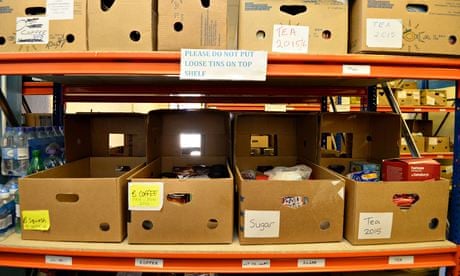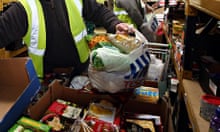A fledgling scheme to provide emergency help to the poorest in the country is in chaos, with £67m left unspent and record numbers of families being turned away.
Figures released in response to Freedom of Information Act requests indicate that by the end of January councils in England were sitting on £67m of the £136m that had been allocated to local welfare schemes. Half of local authorities had spent less than 40% of their funds.
An analysis by the Guardian shows that under the new local welfare assistance schemes, four in 10 applications for emergency funds are turned down, despite evidence that many applicants have been made penniless by benefits sanctions and delays in processing benefit claims. Under the previous system – the social fund – just two in 10 were. In some parts of the country, as few as one in 10 applicants obtain crisis help.
The schemes were designed to help low-income families in crisis, such as those in danger of becoming homeless or subjected to domestic violence. Charities and MPs have warned that those denied help are turning to food banks and loan sharks.
Gillian Guy, chief executive of Citizens Advice, which offers debt and legal advice, said the emergency financial support system was in chaos. "When the safety net fails, people are left with no way of putting food on the table, paying the rent or keeping the lights on. Confusion over what help is available and who to approach means that people who need support are left high and dry.
"People are in danger of being pushed into the arms of payday lenders and loan sharks by the chaotic emergency support system. Citizens Advice bureaux see people in desperate need of support who have nowhere else to turn when jobcentres and the local council don't give out support."
Under the new system, emergency funds are no longer ringfenced, meaning that councils can divert unspent cash to other budgets. Local welfare assistance schemes were created a year ago in 150 English authorities, alongside national schemes in Wales and Scotland, following the abolition of the social fund.
Most schemes do not offer cash or loans, but support in kind, such as food parcels and supermarket vouchers. The social fund provided loans repayable against future benefit payments – typically about £50 – and larger capital grants to destitute families who needed help to furnish flats or replace broken domestic appliances.
Despite charities reporting that demand for help has rocketed as a result of economic hardship and welfare cuts, some councils spent more money setting up and administering their welfare schemes than they gave to needy applicants.
Councils told the Guardian they had provided less in emergency funding than in the past because there was a lack of public awareness of the new system. Some had failed to advertise their schemes, while others set such tight eligibility criteria that many applicants – typically including low-paid working families, benefit claimants and those deemed to have not lived in their local area for long enough – were turned away.
Simon Danczuk, the Labour MP for Rochdale, who has repeatedly raised the issue of local welfare in parliament, said his constituents frequently reported struggles to get crisis help. Constituents he has helped include:
A low-wage family with three children, including an 11-month-old baby, who applied for £35 to pay for gas, electricity and baby food to help them until payday. The council scheme initially referred the family to a food bank. After lobbying by Danczuk, they were given £20 for energy costs, but were refused money for baby food.
A pregnant mother and her partner, who after benefit changes were left with £7 a week for food after rent and council tax. They were told that they could not apply as the scheme was for "genuine emergencies" such as fires and flood.
In each case Danczuk believes the families would have qualified for emergency support under the social fund. "Central and local government are pushing people into the hands of payday loan companies and food banks. They have in effect privatised the lender of last resort," he said.
A spokesman for the Department for Work and Pensions, which funds local welfare schemes run by 150 local authorities across England, said: "In contrast to a centralised grant system that was poorly targeted, councils can now choose how best to support those most in need. It is for local councils to decide how they spend their budgets."
But a Conservative council leader has called on the government to reinstate local welfare assistance funding, calling it a "cut too far". Louise Goldsmith, leader of West Sussex county council, said the proposed cut would leave many low income families without vital support when they were going through a "tough patch in their lives".
A briefing note prepared by the council found that 43% of 5,582 individuals and families helped by the local welfare fund to the end of February had applied because they had been left penniless by benefit sanctions and delays.
The Local Government Association has called upon the ministers to reverse the cut, and it is understood a number of councils and welfare charities are preparing to seek a judicial review of the government's decision to cut local welfare assistance funding in April 2015.
Many councils are using part of their welfare assistance allocation to provide financial support for local food banks, which provide penniless applicants with charity food parcels.
Lady Stowell, a local government minister, told the House of Lords in January that local authorities were "doing a good job of supporting people in times of crisis and are doing it without using all the funding that has been provided so far from DWP". But Centrepoint, the homelessness charity said that local welfare assistance underspending meant many homeless youngsters could not get vital support when they moved from hostels into independent living. "Councils need to start using these funds to address urgent need now and ensure that young people have access to it," said Seyi Obakin, Centrepoint's chief executive.Two local authorities – Labour-run Nottinghamshire county council and Tory-run Oxfordshire – have scrapped local welfare assistance altogether and plan to divert the money into social care services..
Conservative-run Herefordshire had county council spent less than £5,000 of its annual £377,000 allocation by the end of December last year, equivalent to 1% of its local welfare budget.It said its spending reflected low demand for crisis help, a claim disputed by Hereford Citizens Advice and Hereford food bank, which said they had been inundated with requests.
Labour-run Islington council had spent 80% of its emergency funds budget by the end of December last year and had spent all its emergency funds by April. It said it had encouraged its frontline staff to refer individuals to its local welfare scheme to ensure they got crisis help and assistance with any underlying problems, such as debt.
Local authorities are anticipating further problems over local welfare in 2015 when the DWP scraps funding for the schemes. Councils, charities and MPs have called on the government to restore and ringfence the crisis support allocation.
Councils say that in some cases they have refused emergency help because benefit claimants have been wrongly referred to local authority welfare schemes by jobcentres. Some councils have refused to accept applications from those who ought to have been offered a short-term benefit advance from their local jobcentre.
Scotland and Wales have their own welfare assistance schemes and these have higher applicant success rates than in England. In Northern Ireland, which still has the social fund, 70% of applicants received help.










Comments (…)
Sign in or create your Guardian account to join the discussion